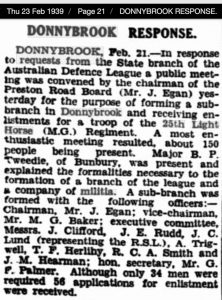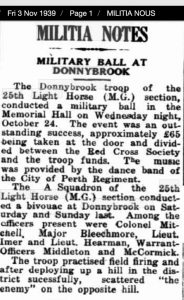Donnybrook Boys – Vern Trigwell, Allan Trigwell, ‘Harry’ Cain & Bert Wall
Vern Trigwell, Allan Trigwell, Harry Cain and Bert Wall – only one came home.
The following details were supplied by the Trigwell family January 2017 – our sincere thanks to Mr. Ossie Trigwell (brother of Vern Trigwell) and Sally Kenton .

25th Light Horse
Vern in middle row furthest right. Harry Cain second row from top, 4th man from left. Allan Trigwell second row from top, 2nd man from left.


The Trigwells and Harry Cain were good friends and all enlisted on 3rd and 4th December 1941. They had worked together as labourers’ at Cain’s farm, Brookhampton.
The Grandfathers of Allan and Vern Trigwell were brothers – their fathers were first cousins.
Harry Cain’s mother was a Trigwell.
Harry Cain was born at Brookhampton (just south east of Donnybrook.) Brookhampton was established as a station in 1898 on the Donnybrook to Bridgetown railway line. A primary school had been operating from 1898 until 1940.
Henry David Cain known as ‘Harry’ was KIA Hill 200, Ulu Pandan on 12th February 1942. It was 2 months plus a couple of days since Harry enlisted. Harry Cain was 21 years old.
Between December 1943 and March 1944 Vern Trigwell was selected as being fit, from either Tamarkan or Non Pladuk camps by the Japanese for ‘Rakuyo Maru’ Party to go to Japan.
On 12th September 1944 the ‘Rakuyo Maru’ sank following a US Navy submarine torpedo attack. Vern Trigwell remained alive for four days holding onto a raft. Vern was one of a large number of POWs to lose their young lives at sea during this incident. He was 24 years old.
‘Fellow soldiers, Bert Wall, Albert Parke and Harry Bunker were able to provide Vern’s family with a few details of his time as a POW.
Bert, having been in C Company, had the most connection with Vern. They were together during much of the fighting, although Bert was with Freddy Webb on artillery and Vern was mostly on rifles. On the night before the allies capitulated, a Japanese shell hit a Chinese chook shed and Vern’s loud voice yelled out, “cut it out, you’re frightening the chooks”. He had jumped on the chook shed roof to make this announcement. On another occasion, Vern had crawled through mangrove swamps to escape Jap fire and when he reached the allied lines, said “Never knew mud was so beautiful!” Vern had been cut off from his group and made his way back alone.
They were together on their journey from Singapore to Burma as part of the first European POW group to work on that end of the line. On their first day when work began at Thanbuzayat, Freddy Webb, Bert Wall and Vern Trigwell each got a shovelful, went “1,2,3” and threw dirt on. They then dug trenches and dragged the dirt to make an SOS!
Albert Parke remembers taking a beating at the 75 kilo camp having given the Japs a “mouthful”.
“…a wallop in the stomach and shoulder laid me low with a belly ache which put me into hospital and nothing to eat for 14 days. Just starting to take a drink when the Japs had a blitz and I was considered fit, 70 in the hospital and to cut it down by half. I left the hospital after a drink at midday. It was a very slow trip, about 250 metres in about five hours + and arrived at dark. I should say a world record. Next morning could not swallow and all that day had nil. So, that night Vern and Bert (at the time they were working in the Jap’s kitchen) decided to pinch a tin of steak and kidney pie. That night they heated it up and as they took the risk they should eat it but they would not, they pinched it for me. Anyway, I just about ate the Dixie as well.”
Bert said that Vern was among the last 48 men evacuated to Tamarkan when work on the line ended. Although slightly built, his farm work had given him a physical advantage over office workers. It is possible that his earlier difficulties with his father had also provided him with a degree of resourcefulness when dealing with the stresses of the POW situation. It must have taken him some effort to hold his tongue though as he was known to be a talker and to speak directly. Harry Bunker reckoned that Vern could talk the leg off an iron pot. During his POW time, Vern made tobacco pipes as a money raising sideline.
On the occasion of Bert’s 21st, (13 October 1943 so probably at Konkhuta), they all pinched sugar, eggs and maize flour and someone took it to the kitchen and made him a cake. He had the day off with malaria (“trying to wangle it”). His mates, including Vern, sat on the end of the bed and ate his cake!
The last memory Bert has of Vern is after leaving the torpedoed Rakuyo Maru, hearing him ask, “Are you alright Wall-ie?”
According to Harry Bunker, Vern was “a good little chap, he was my mate.” The “raft”, which was a hatch coaming that Vern was on had been tied to Bunker’s and others in this group were Alex Spooner, Thomas McMahon, Robert Bell, and Vic Cross. Harry says last saw Vern on the morning of the fourth day after the ship had been torpedoed. He had a sleep and woke to find Vern missing. The official date of Vern’s death is given as 14th which would be the third day, however the circumstances would contribute to some confusion regarding days and dates. Harry also mentioned that it was much cooler for those on wood, they were less dehydrated.
In answering the letters of Vern’s mother in 1945, Harry claimed Vern had said earlier “It looks like curtains Bunk.” Whether that was the case, or whether he was just reassuring her that it was a peaceful ending for her son we will never know.
Vern did manage to get a radio message home, having put his form in while in Saigon. His family finally heard of this message just days before they received the news he was missing believed drowned.’
Allan Trigwell had the misfortune to be one of 36 men from 2/4th MG Battalion to be selected for ‘E’ Force Borneo which departed Singapore after August 1942. ‘E’ Force consisted of 500 AIF and 500 British POWs. He was a young man of steely determination to have survived so long the sadistic brutalities and starvation that was meted out to POWs in Borneo. At the age of 23 years, he finally succumbed to malaria on 4th May 1945 at Sandakan.
Sandakan at that time was being indiscriminately bombed by the Allies. As many as 30 POWs from a wood collecting party were killed on one raid when the pilots believed they were Japanese soldiers. The food situation was critical in the camp; in particular the hospital was being overrun by rats because their source of food had also dried up. Worse, the Camp Commander had received orders on 17th March 1945, to the effect that all POWs were to be exterminated.
POW cards and letters sent prior to his death by Vern Trigwell to his family remain in their possession to this day.
Bert Wall was also a Donnybrook boy. Bert was selected in kumi No. 35 and was a lucky man – he survived the ‘Rakuyo Maru’ sinking. He was rescued by the Imperial Japanese Navy and taken to his original destination – Japan! He and Vern would have met up whilst onboard the ‘Rakuyo Maru’.
Allan Trigwell, Vern Trigwell and Bert Wall were in ‘C’ Company whilst Harry Cain was in ‘A’ Company. Vern and Bert Wall were accommodated at Selarang Camp Changi so the friends were possibly able to hear news about each other from time to time.
Allan Trigwell’s younger brother WX4110 Colin William Trigwell enlisted and joined 2/3rd MG Battalion.



